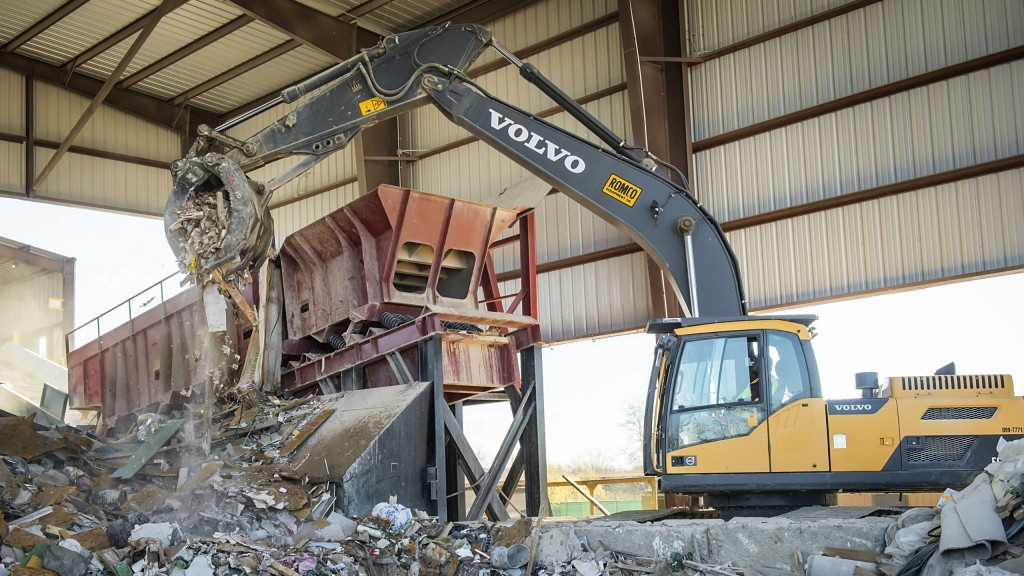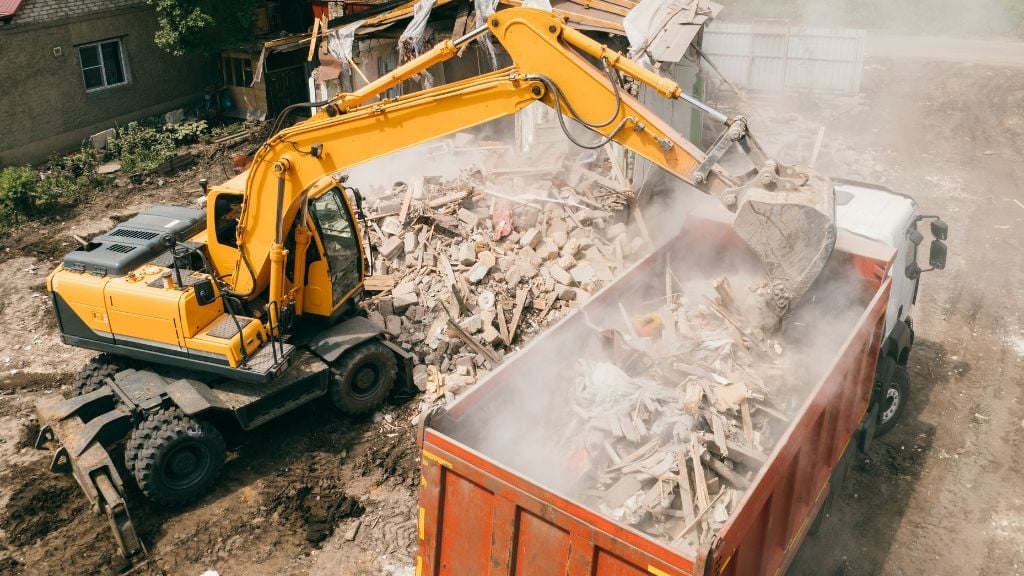No time to waste in the Lone Star state
Champion Waste and Recycling's Town & Country Material Recovery facility brings the convenience of single-stream recycling to C&D contractors in Dallas-Fort Worth, with the support of Volvo CE

Texas is home to barbeques, beef jerky, cowboy boots and now, Town & Country Environmental Services, the first single-stream construction and demolition (C&D) material recovery facility (MRF) in the northern region of the Lone Star state. And it won’t be the company’s last, thanks to rising concerns about environmental sustainability in the US.
According to Construction & Demolition Recycling Association (CDRA) figures, the C&D industry generates more than 480 million US tons of waste materials annually, including concrete, asphalt, asphalt shingles, gypsum wallboard, wood and metals. Thankfully, a full 70% of this waste stream is recycled but not without difficulties. Contractors often rent multiple containers and then struggle to find space for them on active job sites. Additionally, valuable labor time is diverted to sorting materials instead of actual construction and deconstruction work.
Paul Kuhar, vice president of Champion Waste & Recycling Services, heard this collective complaint from contractors large and small. The family-owned operation, founded in 2002, provides a range of container waste and recycling services, and is a member of the US Green Building Council (USGBC) and CDRA.
“For years, our commercial customers were telling us they wanted a hauler that could provide a recycling program where they don’t have to separate construction materials,” Kuhar says.
“A big driver is LEED certification,” he adds. LEED, or Leadership in Energy & Environmental Design, is a green building certification program that recognizes best-in-class building strategies and practices, based on a points scale. “More building projects are going for LEED certification and achieving that involves separating materials. If you have cross-contamination you can lose points – it was very frustrating for these contractors.”
Contractors seeking easier ways to be green triggered Champion to launch its Town & Country MRF. “The timing felt right and we knew if we didn’t open a single-stream C&D facility here, someone else would,” Kuhar says.
Single-stream recycling, common for household and commercial refuse, collects all recyclable materials in one container instead of separating them by solid type. Statistics have shown this method can boost residential recycling by 30%.
Unbeatable fleet
Kuhar and his team scouted single-stream MRF facilities in neighboring states to analyze operations and processing systems.
“We had a ton of questions, one of the biggest being what brand of heavy equipment is the best to move the materials,” Kuhar says. The staple machines of MRF facilities are wheel loaders, excavators and skid steer loaders. Ultimately, it was clear to Kuhar that Volvo CE was a strong contender for his facility. “If you can’t move material fast enough it is going to hinder your overall processing time,” says Kuhar.
Champion’s fleet includes a Volvo L120G wheel loader with a 3.8 m3 (5 yd3) bucket and an L110H wheel loader with a grapple attachment. These are used to load the metering bin and transport bales. An EC250D crawler excavator, meanwhile, works the tipping floor, equipped with a hawkish Nye 2-over-3 grapple. The excavator’s hydraulic system is optimized to match the engine power, reduce power loss, and improve controllability and response time.
All equipment has been factory-fitted with solid rubber tires and guarding protection. That includes two MC135C skid steer loaders with a rated operating capacity (ROC) of 1,366 kg (3,012 lb). “We used to run a competitor brand before our local Volvo dealer, Romco Equipment brought one of these Volvo skid steers out to demo. The comfort of the cab and single-arm design of the skid steer is a huge deal because you have more clearance for the operator. We immediately bought two new ones,” he says.
These five units are supplemented by an agile L30G compact wheel loader, with high speed option and high ground clearance. “It’s a little Johnny Workhorse for wood grinding or loading out plastics,” says Kuhar. “It’s the perfect size small loader for those applications.”
The fleet of Volvo machinery, combined with hard work and determination finally paid off – boosted by winning business from the general contractors of the Dallas Cowboys stadium and Toyota North American World Headquarters.
Reduce, reuse, recycle
Town & Country’s 3,716 m2 (40,000 ft2) facility has the capacity to process 344 m3 (450 yd3) of C&D material per hour. That includes wood, concrete, sheet rock, metals, plastics, glass, cardboard and bricks. Recyclables range in size from 91 cm (3 ft) slabs of concrete to 5.5 m (18 ft) lengths of PVC pipe. In total, more than 1,361 tonnes (1,500 US tons) of material is moved through the facility each day.
“What blows my mind is that prior to having this facility, all of the material you see here was going to landfills. To see the loads come in, be sorted and extracted into their own bunker is impressive,” Kuhar says.
Wood is ground into multiple sizes depending on end-user preferences. A-wood (dimensional lumber) can be used for playground padding or mulch to feed boilers. A-wood is also cut to size and donated to the local Habitat for Humanity chapter for new construction. B-wood (presswood or plywood) is ground for road base at landfills. Concrete and rock are repurposed as construction fill or road base or remixed into new concrete. Metals are sold on the scrap market. Plastics, paper and cardboard are directly recycled.
Kuhar says: “When sourcing new clients we found that the most effective way to make them believers is to bring them in for a tour of the MRF. This blows them away. When they see the volume that comes in and how little actually goes to the landfill once the sorting is complete, they realize this is a game-changer for them.”
“When contractors ask me why they should go single-stream, I tell them, ‘It allows you to do what you do really well- build great facilities- and not worry about how you will recycle. We’ll take care of that,” Kuhar concludes.



